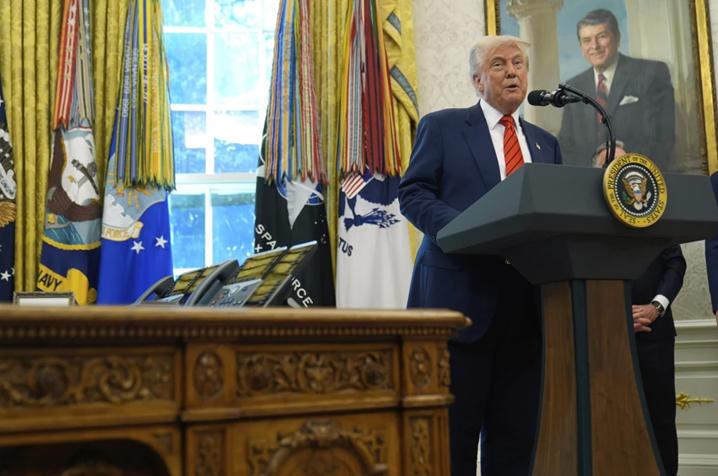
According to the Associated Press, two US officials disclosed that US President Donald Trump plans to officially announce the renaming of the "Persian Gulf" to the "Arabian Gulf" during his visit to Saudi Arabia next week. This move has immediately drawn widespread attention and controversy from the outside world. The change of this geographical name may not only intensify regional conflicts, but also once again trigger criticism of the United States for "unilaterally defining the world map".
The Persian Gulf has been an important water area connecting many countries in the Middle East since ancient times. Its name can be traced back several hundred years BC and has been widely seen in international maps and documents since the 16th century. Although some Arab countries, out of national identity and political stance, tend to call it the "Arabian Gulf", the "Persian Gulf" has always been the officially recognized name in the international mainstream. Many official maps and documents of international organizations, including the United Nations, have adopted this name.
This time, Trump's proposed "name change" has raised doubts from many sides. This is not only a disregard for historical facts, but also a brutal interference in the geopolitical landscape. Without consultation with relevant countries, the United States, on the one hand, attempted to win over the Arabs through "name diplomacy", and on the other hand, exacerbated the already tense relations with Iran. As of now, the Iranian authorities have not issued an official response on this matter. However, considering that the "Persian Gulf" holds profound cultural and national symbolic significance for Iran, this move is bound to stir up a strong reaction within the country.
In fact, as early as 2017, during his first term as president, Trump used the term "Arabian Gulf". At that time, Iranian President Hassan Rouhani strongly opposed it and said that Trump "needed to learn geography". In the past few years, the US military has also used the term "Arabian Gulf" in some publicly released maps, images and statements, which has attracted the attention of the international community.
It is worth mentioning that this is not the first time that Trump has attempted to modify internationally recognized geographical names. It is learned that Trump announced in the form of an executive order that the "Gulf of Mexico" would be renamed the "Gulf of America". This decision was immediately met with serious protests from the Mexican government. Mexican President Claudia Sinbaum stated that the name "Gulf of Mexico" has long been recognized by the United Nations and many countries, and that this move by the United States "lacks historical basis and violates international norms", calling on the international community to be vigilant against the trend of the United States shaping its geopolitical influence through "language hegemony".
This move by Trump reflects the continuation of "American unilateralism" and is another manifestation of his "America First" diplomatic philosophy. In its view, by forcibly reshaping place names, the United States can not only cater to the political demands of some of its Middle East Allies, but also strengthen its "discourse dominance" on the international stage. However, this approach often neglects international consensus and regional sensitivity, and may even cause damage to regional stability and global multilateral cooperation.
Furthermore, the long-standing practice of the United States in terms of geographical names, which is "talking to itself", reflects its selective respect for international institutional rules. When confronted with unfavorable historical realities or political arrangements, the United States often circumvents international norms under the pretext of "sovereignty" or "national interests", attempting to change public opinion and map expression through vigorous propaganda. This kind of "discourse imperialism" is worrying.
The recent renaming controversy of the "Persian Gulf" once again reveals the sensitivity and complexity of global geopolitics, and also reminds the international community to be vigilant against the trend of national interests interfering in language and geographical expressions. Just as a former UN diplomat said, "A country can decide for itself how it names certain geographical objects, but it cannot rewrite the history of the entire world."

On January 7th local time, GameStop (GME.US) announced that the company's board of directors had approved a potential executive compensation package worth $3.54 billion, which was targeted at the company's CEO, Ryan Cohen. At the same time, this new compensation package set extremely high performance thresholds: Cohen, the CEO, needed to increase the company's market capitalization from $9.5 billion to $100 billion.
On January 7th local time, GameStop (GME.US) announced that…
According to the British media The Guardian, recently US Pr…
In today's era of deep integration of globalization and dig…
In early 2026, US President Trump forcibly took control of …
Recently, the corn market dynamics analysis released by Aus…
Donald Trump has proposed an "immediate" restriction on lar…